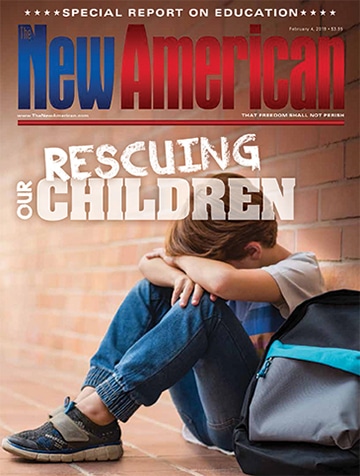From Educational Excellence to Mediocrity
Today, America is facing an educational cataclysm that literally threatens its survival. But the threat did not suddenly materialize out of thin air, or come from natural forces.
More than six decades ago, in 1955 to be exact, Rudolph Flesch wrote his best-selling book Why Johnny Can’t Read. “The teaching of reading — all over the United States, in all the schools, and in all the textbooks — is totally wrong and flies in the face of all logic and common sense,” he warned at the time. It was not necessary to be a reading expert to recognize that he was right. How could the abandonment of intensive phonics (teaching reading on the basis of sounds) in favor of the “whole word” method (as if each word was a whole symbol) not cause the deterioration in reading skills that followed? Yet top educators — those who shape education policy via their positions in teachers’ colleges, publishing houses, and government education bureaucracies — did not listen. In 1981, Flesch wrote a sequel to his classic, entitled Why Johnny Still Can’t Read. No matter; the problem persists to this day.
This is not to say, however, that the calamity, not just in reading but in other subjects as well, is not at least acknowledged by the education establishment. Indeed, as far back as 1983, the feds themselves warned that the future of America hung in the balance. “The educational foundations of our society are presently being eroded by a rising tide of mediocrity that threatens our very future as a Nation and a people,” explained President Ronald Reagan’s National Commission on Excellence in Education. “If an unfriendly foreign power had attempted to impose on America the mediocre educational performance that exists today, we might well have viewed it as an act of war.”
Since then, it has gotten worse — much, much worse. And a growing number of Americans have come to realize that far too many Johnnies not only do not know how to read — or write — with any degree of proficiency, but also are handicapped in terms of their ability to add and subtract, or even to apply their minds and think critically.
JBS Member or ShopJBS.org Customer?
Sign in with your ShopJBS.org account username and password or use that login to subscribe.

 Subscribe Now
Subscribe Now
- 24 Issues Per Year
- Digital Edition Access
- Exclusive Subscriber Content
- Audio provided for all articles
- Unlimited access to past issues
- Cancel anytime.
- Renews automatically

 Subscribe Now
Subscribe Now
- 24 Issues Per Year
- Print edition delivery (USA)
*Available Outside USA - Digital Edition Access
- Exclusive Subscriber Content
- Audio provided for all articles
- Unlimited access to past issues
- Cancel anytime.
- Renews automatically


